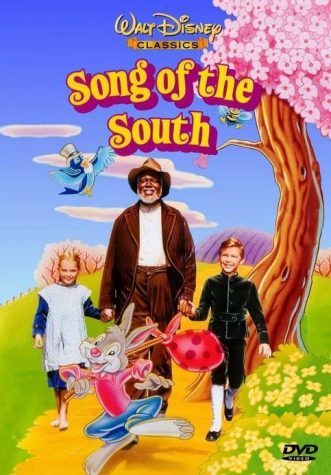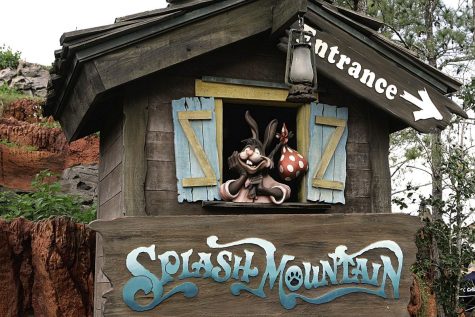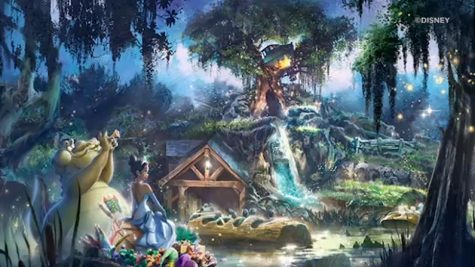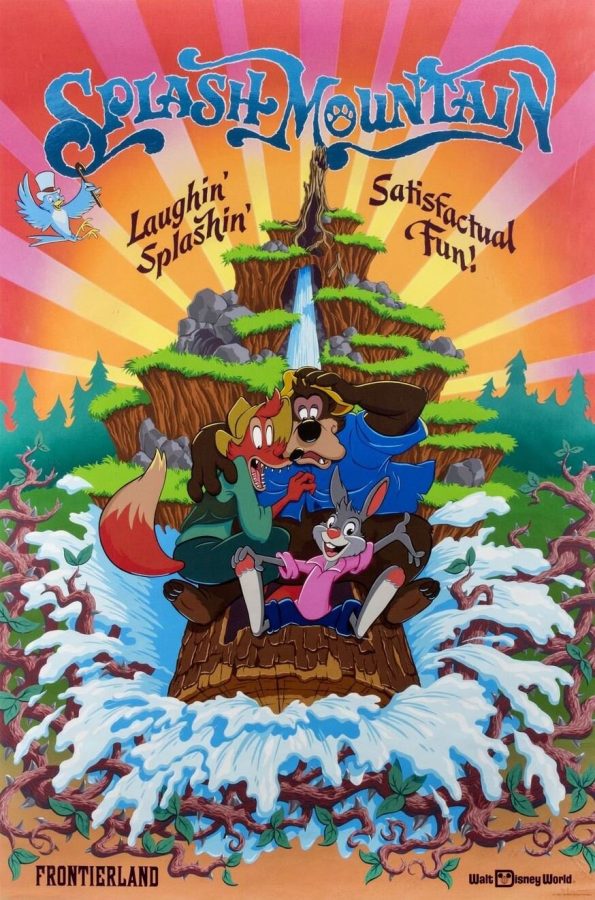Splash Mountain causes controversy
Historic ride is based on movie depicting planation life
February 9, 2021
Mickey and his pals hop on the flume for a ride down Splash Mountain, while others stand back and look at the history behind it.
Splash Mountain is an animatronic flume ride at Disney World in Orlando and Disneyland in Anaheim, California, featuring characters from one of the first Walt Disney Films- Song of the South. The film was released November 12, 1946.
The story follows the Uncle Remus stories about the bunny Brer Rabbit using live action and animation. Following the separation of his parents, a boy goes to live in the South. There he meets Uncle Remus, who gives the boy valuable looks into his problems via the stories he tells about Brer Rabbit.
 This movie has been controversial from the very beginning. It’s a very very old film, so in today’s time what was acceptable for media back then is nowhere near acceptable today.
This movie has been controversial from the very beginning. It’s a very very old film, so in today’s time what was acceptable for media back then is nowhere near acceptable today.
But, whether it’s the depiction of plantation life, black men and women, former slaves or accusations of glorifying the time period in general; you name it, it’s been argued over.
Because many of the scenes have become politically incorrect since its release in 1946, Song of the South is no longer available for rental, streaming, or sale, even in Disney Stores. Despite the film being locked up in the archives and hidden from the constant criticism- the ride still lives on to keep its memory alive.
Although the ride doesn’t feature much of the actual movie plot-wise or (human) character wise, it’s always been a controversial attraction solely based on the movie’s criticism.
In June 2019, Disney announced that they plan on reconstructing the ride to have the theme of Princess and the Frog, a film that follows the adventures of a rather diverse group of people – which was noticeable by many.
Student polls were conducted before and after explanations of the ride. Before an explanation, 75% of NAHS students polled that Splash Mountain is not racist.
After explanations of the controversy and some fact based information, 73% of students said that they agreed the ride should still be changed, but it was mostly people thinking that it was just time for it to naturally be changed.

Senior Kyla Davis says she realizes that some people might be offended, but says she doesn’t see the big deal.
“I don’t really care honestly, it was so long ago,” Davis said. “But my granny, she might care. She might have some relevance to it.”
Davis says it boils down to respect.
“A whole bunch of people might have a different opinion than me,” Davis said. “But everyone’s always going to have their own opinions on something. If white people wanna say something about it, that’s on them. We just asked them to respect the black community.”
However, it’s become increasingly obvious that it’s somewhat a problem of “white guilt” than genuine concern for the ride.
“I feel like that roller coaster ride is probably one of the least important things on people’s list to fix. People are always trying to do way too much,” Davis said. “There’s a difference between being racist and changing something that’s already been there. People now just wanna knick everything that can be deemed racist.”
Some white Americans to feel a sense of “White Guilt” where they feel they have to make up for their ancestors’ mistakes. But while that guilt does play a huge factor into it, it’s also about money, according to Davis.
“You might think that the CEO of Disney is changing the ride because they care,” Davis said. “But I think they care about the money. In my opinion, they just got [thrown] a bone.”
Excitement builds as some fans say changing the ride to Princess and the Frog will be new and fresh.
“I think the ride will be dope because Princess and the Frog is a dope movie,” Davis laughs, joking that, “You might as well replace an old black thing with a new black thing.”
While you may think that changing rides with controversial pasts such as Peter Pan, The Jungle Cruise, and many more is the best way to go; when it comes to being an ally, it could also be a matter of trying way too hard to be “one of the good ones”.
Many acknowledge you can’t erase history, but should focus on making sure we don’t repeat it.
“If something is still sitting on that mountain from that long ago… I don’t care. they should’ve found it racist a real long time ago and took it down,” Davis said. “I just feel like people are trying too hard. If you want to make a change, go to a protest, don’t be silent, speak up. Do something that matters to 2021- not 1938.”


